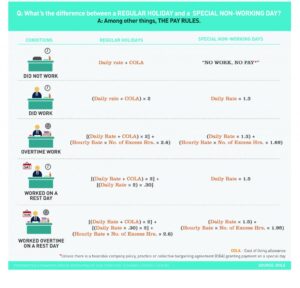Things You Should Know About Holiday Pay, 13th Month, and Christmas Bonus

Employed workers tend to get really excited every time a holiday approaches. This means they get to rest for a bit, recharge all their lost energy, and be with their loved ones, even for just a day or two. Others, however, get excited for another reason—the extra income they’ll get when they report to work on a holiday.
But when it comes to Philippine holidays and its pay rules, are you like me when I first stepped out of college—ignorant as to how to calculate them, neither did I know the difference between regular holidays and non-working holidays? Every time there’s a holiday, all I was concerned about was, “Yey! No 6 AM alarms!”
So, to explain how this complicated world of wages work—from holidays to 13th month pay to Christmas bonuses—let’s take a look at the pay rules we have in our Philippine Labor Code.
TOPICS
Holidays and their Pay Rules
To start off, workers need to remember that regular holidays are days that have fixed dates such as New Year’s Day, Rizal Day, and Christmas Day. Alternatively, special non-working holidays are more flexible and fall entirely under the prerogative of the Philippine president. December 24 and 31 were declared special non-working days by President Aquino so that it’ll entail closer family ties and enable us to celebrate Christmas and New Year’s Eve more meaningfully.
But exactly how do we get paid during these days? Here’s a clear infographic from the Department of Labor and Employment:

Employees who work on holidays are paid more than the overtime rate on regular days. Like, for those who work on regular holidays, they are paid at least 200% of the sum of their daily rate and cost of living allowance (COLA). Moreover, employees who work on special non-working days are paid just 130% of the sum of their daily rate and COLA.
Whether you’re working on a holiday or not, remember that proper compensation for this is a right under the Labor Code. So, make sure you receive the right salary every time you’re asked or required to work on a holiday.
Christmas Bonus Vs. 13th Month Pay
Christmas season is always the number one favorite time of year for salaried employees. Apart from the long vacations, one thing creeping up our consciousness is a big fat paycheck comprised of Christmas bonus and 13th month pay we’ll be receiving—a reward for your year’s worth of blood, sweat, and tears.
But what comprises this year-end reward? Are we all entitled to a 13th month pay and Christmas bonus? Are they both even the same?
Both are different. A 13th month pay is a mandatory and is required by law (Presidential Decree No. 851). It says that: All rank and file employees, regardless of their employment status, and who have worked for at least one (1) month in the company are entitled to receive a 13th month pay.
It is essentially a form of monetary assistance in preparation for the Christmas season. To compute this is you take your monthly basic salary, divided by 12 (months in a year), times the number of months within a year you have rendered your service.
Here’s a clearer picture:
[Php 20,000 monthly pay/12 x 8 months employed]
[basic monthly pay/12 x number of months actually worked]
On the other hand, a Christmas bonus, or just a bonus for that matter, is a gift or reward voluntarily given by an employer as an expression of gratitude for all the hard work you’ve done, and not because it’s an obligation that comes from a law or contract.
To recap: A 13th month pay is mandatory under the law; while a Christmas bonus is substantially an act of kindness and generosity from the employer.
However, there may be instances where bonuses become demandable. Remember that you cannot demand for a bonus since it’s only given freely, unless it has already become a long-standing tradition in the company, then yes, you may demand for it. If an employer withdraws from giving bonuses after years of practicing it, let’s just say it’s considered a wrongful act under the Labor Code, and may draw in some sanctions for the company.
Now that you know a lot more about holiday pays and bonuses, make sure you know how to spend those hard-earned cash wisely!





No comment available yet!